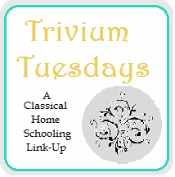 So far in this series, I’ve shared about the basics of classical education and the rigors of classical science. Today, I want to share a brief overview of what classical science curriculum can look like for the grammar stage student.
So far in this series, I’ve shared about the basics of classical education and the rigors of classical science. Today, I want to share a brief overview of what classical science curriculum can look like for the grammar stage student.
What is a grammar stage student?
A grammar stage student can mean different things to different people. So let me clear up the confusion by saying that I mean the years when the student is learning the foundational basics, such as phonics, spelling and how to add, subtract, multiply and divide.
These are the years when the student is full of wonder and when he or she wants to know everything about everything. During the grammar stage years, the student is peppering you with questions that begin with, “Mom, what’s ______________”.
We like to compare the grammar stage student to an empty bucket that is begging to be filled. He or she has a natural curiosity combined a high capacity for retaining information.
So, when teaching science you will be playing to these strengths while building their knowledge base of scientific facts. You can also use science to work on their basic skills of writing and reading at this stage.
What are the goals for teaching science to a grammar stage student?
There are two goals for classical science education during the grammar stage years:
- To create an interest in the student for learning science.
- To fill the student’s mind with interesting, but basic scientific information.
In a nutshell, your goal for these years is to spark a desire within your student to learn science.
What should classical science curriculum include?
In a classical science curriculum, the above goals can be fulfilled through the following three basic components and two optional ones. The basic components are:
- Scientific Demonstrations — The purpose of this doing scientific demonstrations at this level is twofold. The first reason is to work on the student’s observation skills and the second is to increase his or her scientific knowledge. Although it is not considered a traditional tool in a classical science curriculum, you can also use nature study to fulfill the purpose of the scientific demonstrations.
- Science-Oriented Books — Typically the classical educator turns to science encyclopedias for sharing pertinent information with his or her student. There are many children’s encyclopedia publishers, such as Usborne, Kingfisher, and DK, that present scientific information in an interesting way on the level of a grammar stage student. I would also like to suggest that you can use living books, such as the Sassafras Science or Let’s Read and Find Out series for this component. As your student begins to be able to read more complicated stories on his or her own, add in one or two books on scientists per year. These will help the student to engage with the face of science which will spark his or her desire to learn more.
- Notebooking — Narration and notebooking are hallmarks of a classical education. They work in partnership to become an extremely effective tool that will teach your student how to assimilate and release information. The purpose of this component in science is for you to verify that he or she placed at least one new piece of information into his or her bucket.
The optional components are:
- Multi-week Projects — Multi-week projects are a great way for the student to engage with the material he or she is learning over a longer period of time. These projects, which are done over several weeks, need to relate to what you are studying and reinforce what the students need to know.
- Memorization — For some memory work is optional, for some, it is not. It can include poems, lists of facts and/or vocabulary. Just remember that your grammar stage student is an empty bucket which is begging to be filled. Memory work is one of those tools that you can use to fill their knowledge banks with information that he or she will be able to draw on later.
When you plan out your year, make sure that your scientific demonstrations, science-oriented books, narrations, multi-week projects, and memory work all tie together.
In other words, your week can look like this:
- Create a model of the spine with the student;
- Read a section about the skeletal system with him or her;
- Have the student tell you what he or she has learned about the skeletal system and record it in his or her notebook;
- Work on memorizing the purpose of the skeletal system;
- Add a portion of the skeletal system to a representation of the human body.
When you tie the 5 areas together, they reinforce one another and create a stronger peg of knowledge in the mind of the grammar stage student.
Resources for creating a classical science curriculum
I highly recommend the following books to help you formulate a plan for your classical science curriculum:
- The Well-trained Mind: A Guide to Classical Education at Home by Jessie Wise and Susan Wise Bauer — The suggestions in this post are loosely based on this book and I believe that this book should be required reading for all classical educators! It will give you a fuller picture of classical education as well as the learning stages that your students will go through.
- Success in Science: A Manual for Excellence in Science Education by Bradley and Paige Hudson — Brad and I have written this book to be a starting point for those desiring to teach science. It lays out a clear roadmap for teaching this subject in your homeschool. While the book is not aimed specifically at classical educators there are several sections that will help you to gain a clearer picture of what classical science can look like.
If you don’t want to design your own classical science curriculum, check out the programs of Elemental Science. We have created a full line of grammar stage curricula that makes classical science easy for homeschoolers!
A quick word about kindergarten
If you decide to do science before the grammar stage years, it should be very hands on and parent directed. You can read my thoughts on preschool science to get an idea of what it can look like. However, let me be clear in saying that kindergarten science should only be done if your student enjoys it.
I’ve added this post to the classical homeschooling link-up, “Trivium Tuesdays” hosted by Living and Learning at Home. There is a wealth of information on the subject in these posts, so be sure to check it out!
If you have any questions about classical science, please feel free to leave them in the comments and I answer them as soon as I am able. Next month, I’ll be sharing more specifics for the logic stage. If you don’t want to miss that article, be sure to subscribe here.
 Sign up below to receive weekly tips & tools for homeschool science and we'll send you a FREE copy of
Sign up below to receive weekly tips & tools for homeschool science and we'll send you a FREE copy of 
